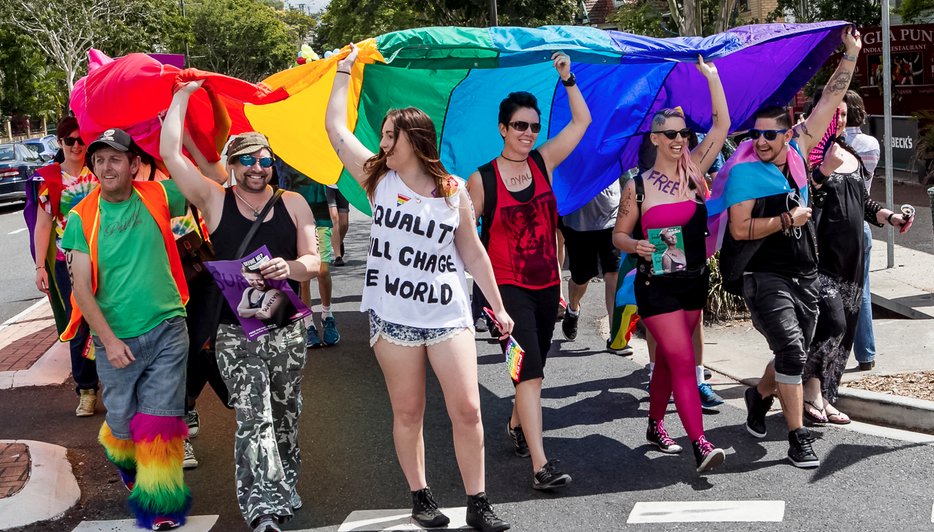
In a significant stride towards fostering inclusivity and safeguarding human rights, Queensland has now implemented new amendments to its Anti-Discrimination Act that will help protect the LGBTQIA+ community.
Effective as of April 29, these reforms not only bolster penalties for hate crimes but also extend crucial protections to marginalised communities, marking a profound shift towards equality under the law.
Harsher Anti-Discrimination Penalties
A primary focus of the Anti-Discrimination amendments lies in the imposition of harsher penalties and longer jail times for crimes committed on the basis of hatred towards an individual’s sexuality, gender identity, sex characteristics, race, or religion.
This legislative update sends a clear message: discrimination in any form will not be tolerated within Queensland’s borders.
Of notable significance is the explicit protection now afforded to non-binary or gender-diverse individuals, a milestone that brings Queensland in alignment with progressive measures adopted elsewhere in Australia. Historically, this demographic has grappled with systemic invisibility and exclusion, a reality that these legal reforms seek to rectify.
Equally noteworthy is the inclusion of intersex individuals within the scope of vilification law—a landmark provision aimed at curbing discrimination based on sex characteristics. By acknowledging and addressing the unique challenges faced by intersex persons, Queensland is bringing more visibility to an often overlooked section of our community.
Central to these amendments is the broadening of the definition of gender identity, acknowledging the need for changes in the use of language relating to sex and gender.
Furthermore, the legislation sees the criminalisation of hate symbols, helping to combat all forms of bigotry and intolerance.
In statement in 2023 when the legislation was passed the Queensland Human Rights Commission reiterated the importance of the changes and how it will impact the criminalisation of these activities.
“The criminal offence of serious vilification will be moved from the Anti-Discrimination Act to the Criminal Code, and will have a higher penalty,” the QHRC said in a statement.
“When crimes like assault, going armed so as to cause fear, threatening violence, wilful damage, trespass and public nuisance are motivated by hatred or serious contempt because of the victim’s race, religion, sexuality, gender identity or sex characteristics, courts will be able to impose a tougher penalty including longer custodial sentences.”
The maximum penalty for an offence of “serious racial, religious, sexuality or gender identity vilification” may attract a prison term of up to three years, up from the existing punishment of six months imprisonment.
In a follow up statement this week they also acknowledged the important of supporting non-binary and intersex people in this process.
“Protections against gender identity discrimination and vilification have been in place since 2002 but were unclear and inconsistent, leaving non-binary and intersex people out altogether or forcing them to navigate confusing legislative provisions or multiple jurisdictions to advocate for themselves and their communities” they said.
“Society’s understanding and attitudes towards harassment, discrimination and vilification have changed considerably”
Attorney-General and Minister for Justice and Minister for the Prevention of Domestic and Family Violence Leanne Linard said of the bill during its consultation period.
“In the three decades that have passed since Queensland first introduced Anti-Discrimination legislation, society’s understanding and attitudes towards harassment, discrimination and vilification have changed considerably.
“The Anti-Discrimination Bill we have drafted in response to the Human Rights Commission’s recommendations better reflects a contemporary understanding of equality.
“The Bill represents significant law reform for our State, and it aims to strike a fair balance between competing rights and interests.”
James McCarthy, President of the Brisbane Pride Festival, welcomed the change in legislation.
“This is a significant step forward for our community and Qld will be a better place because of it” he stated.
“We all owe a massive thank you to those whose persistence and advocacy for change made this possible.”
These reforms, long overdue, signify a move towards strengthening protections for Queensland’s LGBTIQ+ communities, ensuring that every individual, regardless of their identity or background, is treated with dignity and respect under the law.
Queensland has not always been a safe place
Historically, Queensland had some of the most stringent laws regarding homosexuality in Australia.
Until 1990, homosexuality was criminalised in Queensland under laws inherited from British colonial rule.
The laws categorised homosexual acts as illegal and punishable offences, often leading to persecution, discrimination, and social stigma against LGBTQIA+ individuals, particularly gay men.
The most notorious of these laws was the “Criminal Code Amendment Act 1899,” which classified homosexual acts as “indecent practices” and imposed severe penalties, including imprisonment and forced psychiatric treatment.
The oppressive legal framework persisted, despite growing calls for reform and societal attitudes gradually shifting.
It wasn’t until the landmark “Criminal Code Amendment Act 1990” that Queensland finally decriminalised homosexuality, marking a significant turning point in the state’s legal history.
This legislative milestone paved the way for subsequent reforms aimed at promoting equality and safeguarding the rights of LGBTQIA+ individuals in Queensland.
Over the years, Queensland has made strides in enacting anti-discrimination laws and measures to protect LGBTQIA+ rights, culminating in the recent amendments to the Anti-Discrimination Act that provide enhanced protections and penalties for hate crimes.
Despite this progress, the legacy of past discrimination continues to impact LGBTQIA+ communities in Queensland.
However, ongoing efforts by activists, lawmakers, and allies seek to challenge prejudice, promote inclusivity, and ensure that all individuals are treated with dignity and respect, regardless of their sexual orientation or gender identity.




